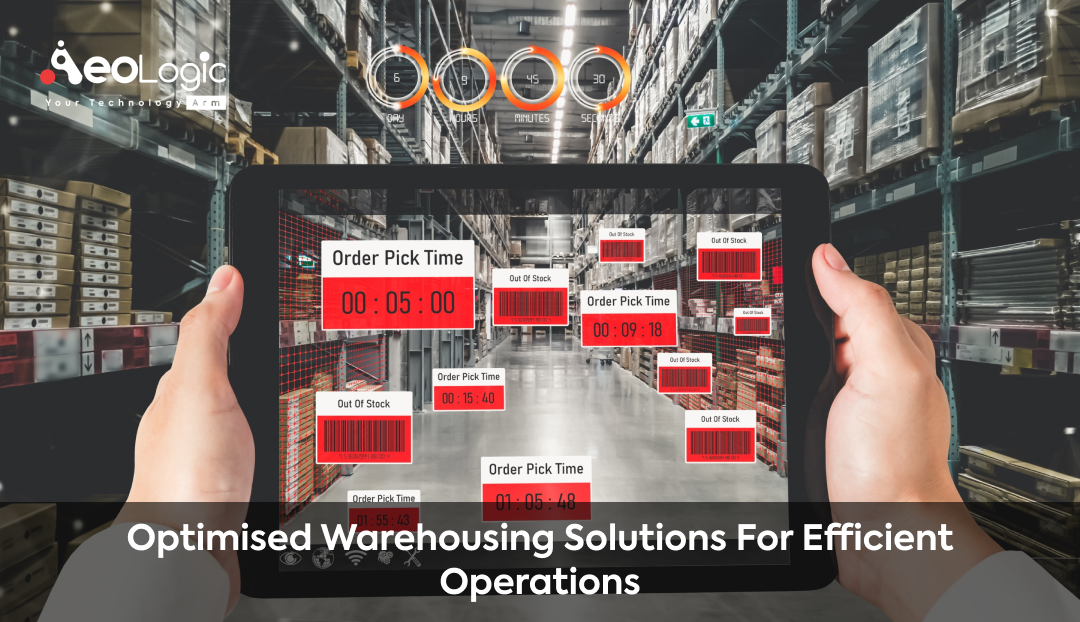In the bustling world of logistics, the heart that keeps the supply chain pulsing is undoubtedly the warehouse. It’s the critical nexus point where goods transition from production to delivery, making efficient warehousing solutions not just ideal but essential. Optimizing warehousing operations can lead to significant gains in speed, accuracy, and customer satisfaction. Let’s delve into how such solutions can transform your warehouse into a paragon of efficiency.
The Statistics Behind Warehousing Efficiency

Did you know that, according to a report by Zebra Technologies, 77% of logistics companies expect to be handling more items by 2024, with a majority citing warehousing as a key area for investment? This showcases the importance of efficient warehousing solutions in today’s rapidly expanding market. Investing in optimized warehousing is not just a matter of keeping up; it’s about staying ahead. With the right systems in place, warehouses can become more than storage spaces; they can transform into dynamic engines of productivity.
Also Read: What is Warehouse Logistics? Challenges, Benefits, and Best Practices
Streamlining Processes with Technology
In the age of technology, ignoring the benefits of digitalization in warehousing solutions for efficient operations is like refusing a life jacket on a sinking ship. Automation, for instance, is revolutionizing warehouses. Automated guided vehicles (AGVs), robots, and drones are taking over repetitive tasks, reducing human error, and speeding up operations. Warehouses that integrate such technologies report a reduction in picking errors by as much as 70%, according to a study by MHI. It’s clear: tech-empowered warehousing is the future.
Data-Driven Decision Making
Information is power, especially in warehousing solutions for efficient operations. Leveraging big data analytics can fine-tune inventory management, leading to a decrease in overstock and stockouts. Smart warehouses use data to forecast demand, optimize picking routes, and manage resources effectively. With proper data integration, warehouse managers can make informed decisions that not only streamline operations but also significantly cut down costs.
The Role of Warehouse Management Systems (WMS)
A Warehouse Management System (WMS) is akin to the brain of optimized warehousing solutions for efficient operations. It orchestrates every move, from receiving to shipping. A robust WMS can increase inventory accuracy to a staggering 99%, according to a study by the American Productivity and Quality Center (APQC). It’s a tool that provides real-time data, helps in managing resources, and ensures that the warehouse is running like a well-oiled machine.
Also Read: The Role of AI in Education And Learning: Just Promises Or Revolution
Training and Employee Engagement
While technology is a cornerstone of warehousing solutions for efficient operations, the human element cannot be overlooked. A workforce that is well-trained and engaged can make a significant difference. By investing in employee training, warehouses see a direct impact on productivity and error reduction. Engaged employees are also more likely to contribute to process improvements, making them invaluable assets in the quest for operational efficiency.
Sustainable Practices in Warehousing
Sustainability is no longer a buzzword but a business imperative, even in warehousing solutions for efficient operations. Implementing green initiatives, such as energy-efficient lighting, solar panels, and sustainable packaging, not only benefits the environment but can also lead to cost savings. Moreover, consumers are increasingly favoring companies with a strong commitment to sustainability, making it a win-win situation for businesses and the planet alike.
The Impact of E-commerce on Warehousing
E-commerce has put an unprecedented strain on warehousing solutions for efficient operations. With the e-commerce market expected to reach $6.54 trillion by 2022, as reported by Statista, warehouses must adapt to the high-volume, fast-paced demands of online shopping. This includes rethinking storage solutions, pick-and-pack processes, and delivery logistics to ensure that customers’ expectations for speedy deliveries are met.
Cutting-Edge Robotics and Automation
Robotics and automation continue to push the boundaries of what’s possible in warehousing solutions for efficient operations. These technologies not only speed up processes but also work around the clock, providing a level of consistency that’s hard to achieve with a human workforce alone. From inventory drones to robotic arms, the integration of these technologies is creating a competitive edge for those willing to invest in them.
The Future of Warehousing Solutions
What does the future hold for warehousing solutions for efficient operations? One thing is certain: it’s a future brimming with potential. (yurtsofamerica.com) Advancements in artificial intelligence, machine learning, and the Internet of Things (IoT) are set to take warehousing efficiency to new heights. These technologies will enable predictive analytics, autonomous operations, and even more personalized customer experiences.
Here are five key points that encapsulate the trajectory we’re on:
- Integration of the Internet of Things (IoT): IoT is set to revolutionize warehousing operations by connecting every aspect of the warehouse. Sensors, wearables, and smart devices will communicate in real-time, optimizing the flow of goods and reducing the risk of errors.
- Advancements in Artificial Intelligence (AI): AI will provide warehouses with predictive capabilities, allowing for better demand forecasting and inventory optimization. This technology will enable smart warehouses to anticipate issues before they arise, ensuring a smooth operation.
- Machine Learning for Predictive Maintenance: Machine learning algorithms will predict when equipment is likely to fail or need maintenance, minimizing downtime and keeping warehousing operations running smoothly.
- Autonomous Vehicles and Drones: Self-driving forklifts, vehicles, and aerial drones will become standard in warehouses, speeding up the movement of goods and improving safety by reducing the need for human intervention in high-risk tasks.
- Personalized Customer Experiences: Warehousing solutions will not only be about internal efficiency but will also focus on the end consumer. Customized packaging, faster delivery times, and improved order accuracy will all contribute to a more personalized shopping experience.
The warehousing industry is standing on the cusp of a technological revolution that promises to redefine warehousing solutions for efficient operations. These advancements will not only improve efficiency and productivity but also create new opportunities for service offerings and customer satisfaction.
Also Read: RFID Solutions for Inventory Tracking in Your Warehouse
Final Words
Warehousing solutions for efficient operations are not just about staying competitive; they’re about redefining what’s possible in the logistics industry. By embracing technological advancements, focusing on data-driven strategies, and fostering a culture of continuous improvement, warehouses can achieve unprecedented levels of efficiency and productivity. It’s a transformation that goes beyond mere optimization; it’s about setting a new standard for operational excellence.
Embrace the future of warehousing with Aeologic Technologies, where efficiency meets innovation.









